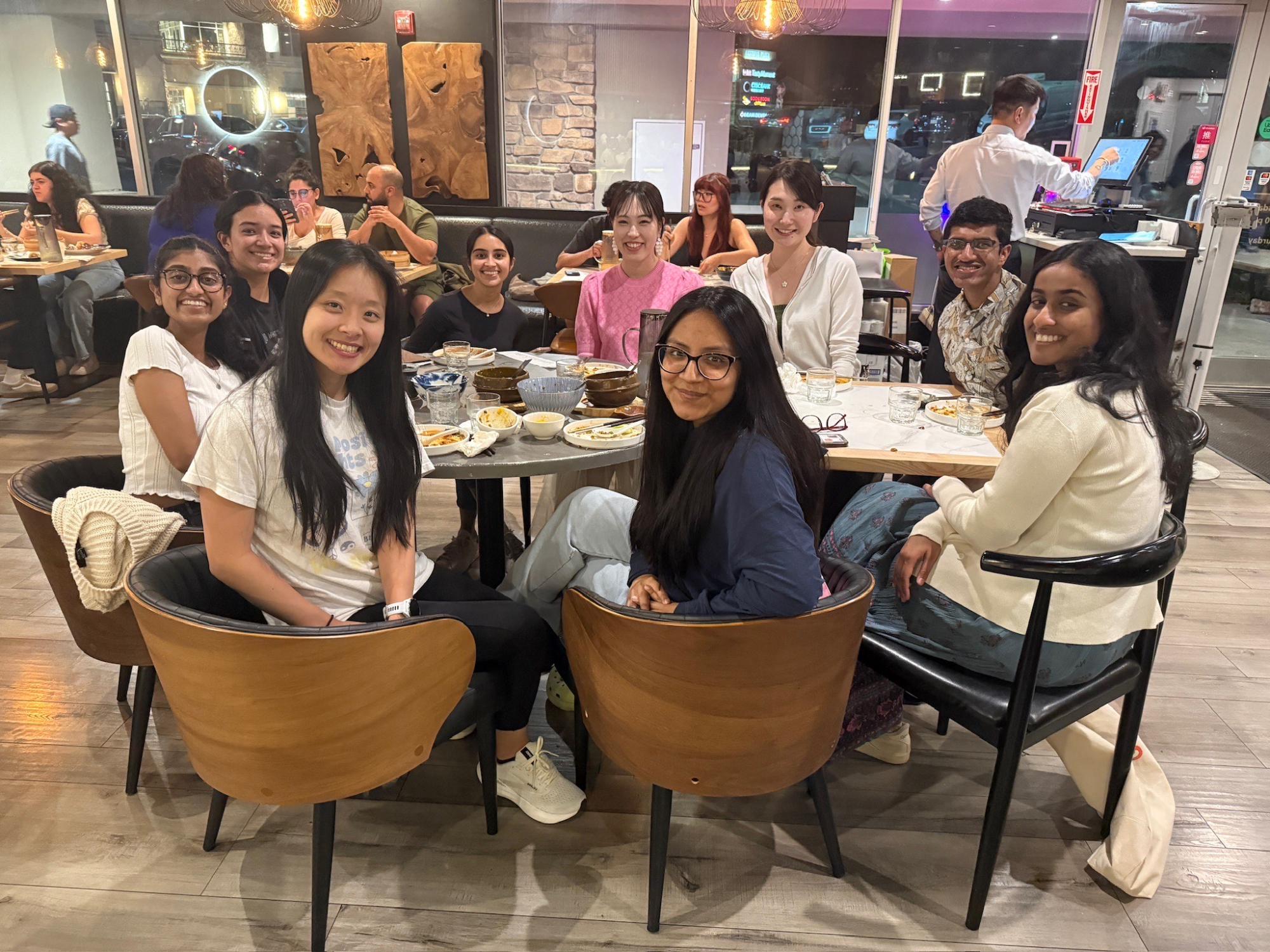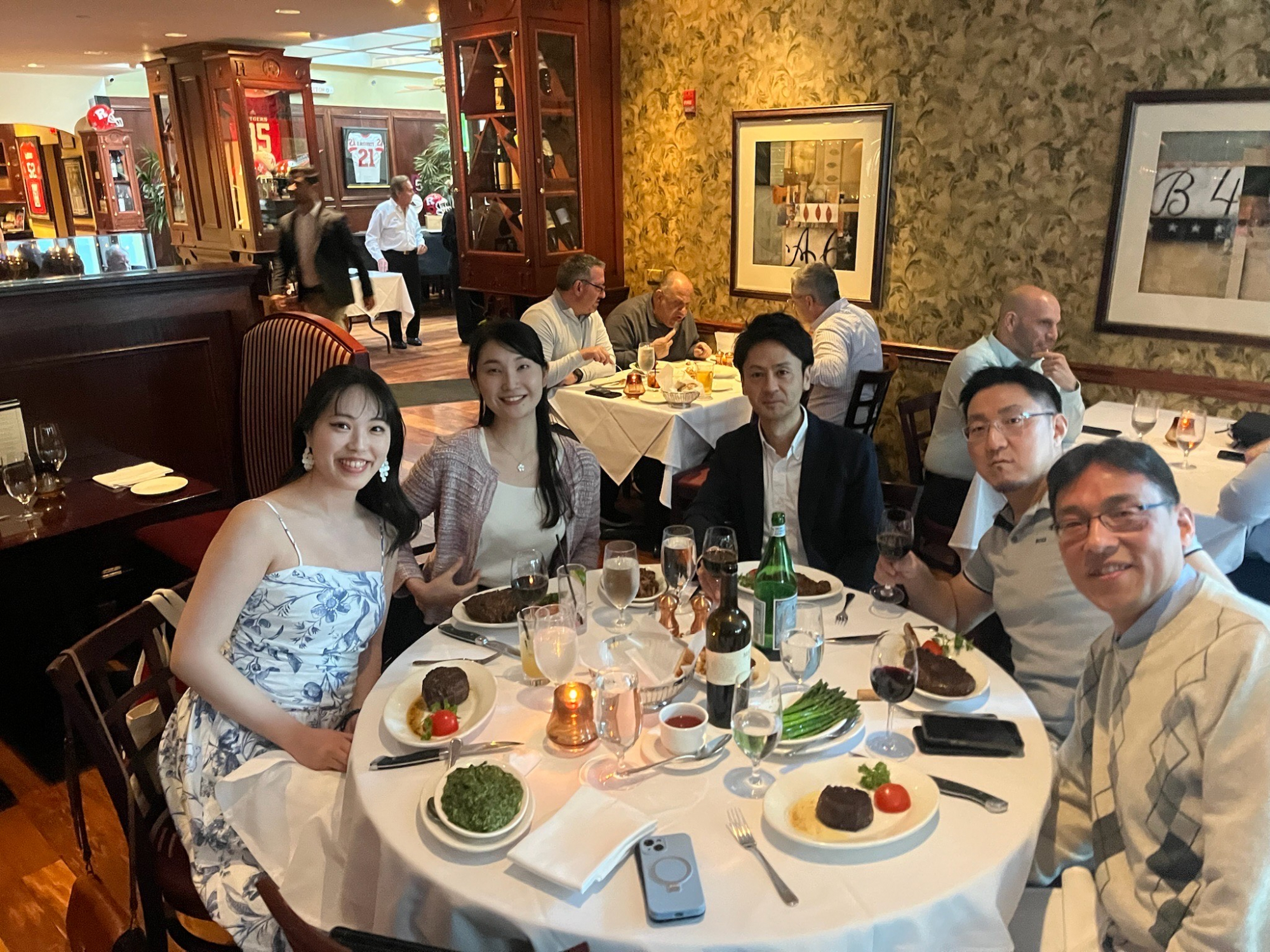International and Domestic exchange
Yoshino Hiromoto
After completing clinical training at Rutgers University
I did clinical training at Robert Wood Johnson Medical School in New Jersey, USA for four weeks from April 7th to May 2nd, 2025. I have loved studying English since I entered university, and for the past five years, I have devoted myself to studying English as much as I did to studying medicine. Therefore, I had a strong desire to participate in this overseas training. I was blessed with this valuable opportunity, and was able to spend a very fulfilling month.
I arrived in New Jersey three days before the start of my internship, and first of all I had to deal with the 13-hour time difference. Because the day and night are the exact opposite of Japan, I had a hard time falling asleep during the first few nights, coupled with the excitement for the coming month. Before the internship, Dr. Angela showed me around Rutgers University, and I was very surprised at how large it was. There are multiple campuses, and we used the university-run student bus to travel between campuses. The university has a movie theater, restaurants, tennis courts, and even a ranch, and it seemed like the whole city was the university. It took 30 to 40 minutes by bus and on foot from the town of Piscataway where we were staying to New Brunswick, where the hospital was located, but I enjoyed the New Jersey cityscape every morning on my way there.
During my clinical training, I rotated through the Department of Diabetes and Endocrinology in the first week, Family Medicine in the second week, and Surgery in the third and fourth weeks.
During my first week in the Endocrinology Department, I mainly observed outpatient treatment from 8am to the evening. Unlike in Japan, in the US, patients generally wait in the examination room while doctors visit each room. Many of the patients were from outside the US, including Asian and European descent, and many from South America who could only speak Spanish. For such patients, there was a system in place where a resident interpreter could speak to them over the phone, and I witnessed firsthand how medical care was provided to accommodate diverse backgrounds.
Also, when there were no outpatient appointments, the professor of endocrinology gave me an assignment to read a paper he had written, create a PowerPoint presentation based on it, and present it in English the next morning. I don't have much experience presenting the contents of a medical paper in English in Japan, so it was difficult to put it all together in one day, but it was a valuable experience that only an overseas internship could provide.
In the second week, I visited Family Medicine under Dr. Lin. Family Medicine is a specialized field of general medicine that treats a wide range of illnesses and health problems for all ages, from children to the elderly. When I visited the outpatient clinic, I was impressed by the knowledge and experience of Dr. Lin, who treats a wide variety of patients with major complaints such as ADHD in children, obesity in adults, chronic pain, and swelling in the legs.
This week, we also had the opportunity to visit the Promise Clinic. The Promise Clinic is a student-run free clinic that is open once a week for people without insurance, such as the homeless and illegal immigrants. Students from the first to fourth years form teams, and the students are responsible for everything from taking the patient's medical history to creating the medical records and deciding on the treatment plan. For patients who only speak Spanish, a student from the team acts as an interpreter, and the first and second year students take the patient's medical history, and the fourth year students provide supplementary information. Each student plays a role. I was very surprised at how smoothly the medical treatment went, which made it hard to believe that they were all students. I was inspired by their knowledge and ability to respond, and felt that I myself would work even harder. Furthermore, through interactions with local students, I learned about the unique American health insurance system and immigration issues, and strongly felt the differences between the medical system in Japan and the United States.
In the third and fourth weeks, I rotated around the cardiac surgery, neurosurgery, and general surgery departments. The main part of my training was observing surgeries, and when there were no surgeries, I observed examinations, made ward rounds, and participated in conferences.
The first thing that surprised me was how early the surgeries started. In cardiac surgery, patients entered the operating room at 6:45am, and the first surgery was finished by around 10am. In neurosurgery, the conference started at 6am, and surgery began at 7:30am. American hospitals are very morning-oriented, performing multiple surgeries a day while also making efforts to allow medical staff to go home early. In cardiac surgery, I was able to observe coronary artery bypass surgery and aortic valve replacement surgery from up close to the surgeons, which was a very educational experience.
There were many Japanese doctors in the surgery department, and we were able to hear about how they came to work in the United States and about the USMLE. The doctors invited us to their homes and took us out to eat, and we had many opportunities to interact with them, so we were able to hear real stories about life as a doctor in the United States. The doctors also taught us the importance of thinking about what you are interested in and what you enjoy doing. As a sixth-year student, I was thinking about my future career, and I had been focusing only on realistic perspectives such as how easy it is to work as a woman and medical needs, so these words were a big realization for me, as I had almost lost sight of what I really wanted to do. The opportunity to think again about what kind of doctor I want to be was a particularly memorable experience from this internship.
Since the training was off on the weekends, I was able to visit various places, including New York, Princeton, and Washington, D.C. I experienced the scenery and cityscape that are completely different from Japan, and the difference in public safety. While enjoying my time in America, I was also reminded of the good things about Japan.
Not only the hospital staff, but also the local people were very friendly and quickly helped me when I was in trouble, so I was able to finish my month safely without any major issues, even though it was my first time in the U.S. Also, through my interactions with the students at Rutgers, I was exposed to differences in how people perceive things and think, and I strongly felt that I wanted to see the world from a broader perspective.
This overseas training program was definitely one of the most memorable experiences of my student life, and I am truly glad that I was able to participate.
I would like to express my sincere gratitude to Professor Yoshimura and Professor Ishido, who allowed me to participate in this study abroad program, the staff at the International Exchange Center, the many doctors and students who helped me during my stay, my Japanese friend Enko, who helped me so much, and Taka-san, who participated in the internship with me. I would like to express my sincere gratitude to everyone who was involved in this program. Thank you so much.

